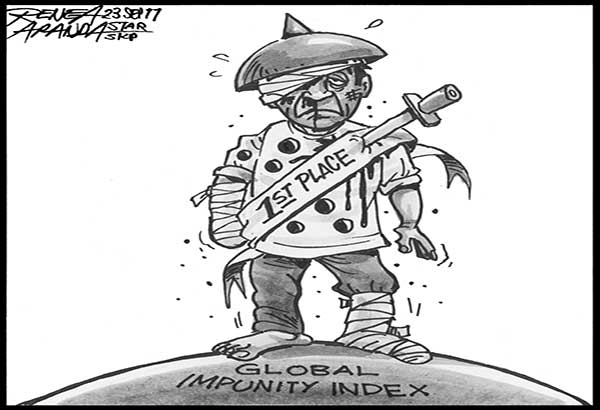EDITORIAL - Worst in impunity

Violence related to organized crime and terrorist activities by groups linked to the Islamic State placed the Philippines in the worst spot in the Global Impunity Index or GII drawn up by the Mexico-based University of the Americas Puebla or UDLAP and its Center of Studies on Impunity and Justice.
This GII is different from an index of the same name that focuses on violent attacks on journalists. The UDLAP study also covers only 69 out of the 124 United Nations members because information on security and justice was insufficient in the other states. But both studies ranked the Philippines among the worst because of the weak capacity to prosecute crimes and bring perpetrators to justice.
The UDLAP index stresses that impunity can lead to socioeconomic and legal inequality, rule-of-law problems and more human rights violations. It can aggravate corruption and violence, retard economic development and the ability to attract foreign investment and tourism.
The UDLAP index covers structural, functional and human rights dimensions of impunity. The human rights dimension is based on cases of torture, “homicides perpetrated by public officials, political imprisonment, extrajudicial killings, massive homicides, and disappearances.”
Ranked behind the Philippines were India, Cameroon, Mexico, Peru, Venezuela, Brazil, Colombia, Nicaragua and the Russian Federation. Surely there are countries where impunity is just as bad or worse among the 124 UN member states that were excluded from the study. But regardless of the Philippines’ ranking if all UN states were included, no one will dispute the observation that the country suffers from institutional weaknesses in every aspect of the criminal justice system, from law enforcement to prosecution and corrections. The country received the worst rating in terms of the delivery of justice.
Frustration with the justice system has led to public tolerance of brutal methods of fighting criminality including the drug menace. This public support has emboldened the police, leading to abuses and impunity. Unless the nation moves decisively to boost the state’s capacity to deliver justice, law enforcement short cuts will continue to enjoy a measure of public support, and impunity will become worse.
- Latest
- Trending


























